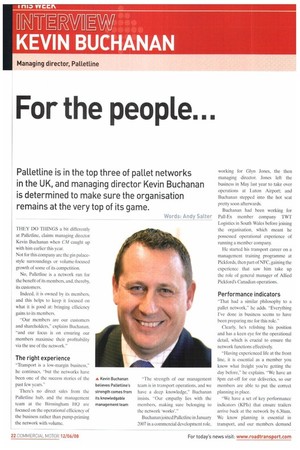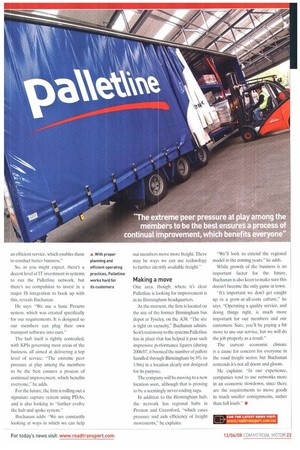For the people...
Page 22

Page 23

If you've noticed an error in this article please click here to report it so we can fix it.
Palletline is in the top three of pallet networks in the UK, and managing director Kevin Buchanan is determined to make sure the organisation remains at the very top of its game.
Words: Andy Satter
THEY DO THINGS a bit differently at Palletline, claims managing director Kevin Buchanan when CM caught up with him earlier this year.
Not for this company are the gin palacestyle surroundings or volume-focused growth of some of its competition.
No. Palletline is a network run for the benefit of its members, and, thereby, its customers.
Indeed, it is owned by its members, and this helps to keep it focused on what it is good at: bringing efficiency gains to its members.
"Our members are our customers and shareholders," explains Buchanan, "and our focus is on ensuring our members maximise their profitability via the use of the network."
The right experience "Transport is a low-margin business,he continues, "hut the networks have been one of the success stories of the past few years."
There's no direct sales from the Palletline hub, and the management team at the Birmingham HQ are focused on the operational efficiency of the business rather than pump-priming the network with volume. "The strength of our management team is in transport operations, and we have a deep knowledge," Buchanan insists. "Our empathy lies with the members, making sure belonging to the network 'works'," Buchanan joined Palletline in January 2007 in a commercial development role. working for Glyn Jones, the then managing director. Jones left the business in May last year to take over operations at Luton Airport; and Buchanan stepped into the hot seat pretty soon afterwards.
Buchanan had been working for Pall-Ex member company TWT Logistics in South Wales before joining the organisation, which meant he possessed operational experience of running a member company.
He started his transport career on a management training programme at Pickfords, then part of NFC, gaining the experience that saw him take up the role of general manager of Allied Pickford's Canadian operations.
Performance indicators "That had a similar philosophy to a pallet network," he adds. "Everything I've done in business seems to have been preparing me for this role."
Clearly, he's relishing his position and has a keen eye for the operational detail, which is crucial to ensure the network functions effectively.
-Having experienced life at the front line, it is essential as a member you know what freight you're getting the day before," he explains. "We have an 8pm cut-off for our deliveries, so our members are able to put the correct planning in place.
"We have a set of key performance indicators (KPIs) that ensure trailers arrive back at the network by 6.30am. We know planning is essential in transport, and our members demand an efficient service, which enables them to conduct better business."
So, as you might expect, there's a decent level of IT investment in systems to run the Palletline network, but there's no compulsion to invest in a major IS integration to hook up with this, reveals Buchanan.
He says: "We use a basic Peracto system, which was created specifically for our requirements. It is designed so our members can plug their own transport software into ours."
The hub itself is tightly controlled, with KPIs governing most areas of the business, all aimed at delivering a top level of service: "The extreme peer pressure at play among the members to be the best ensures a process of continual improvement, which benefits everyone," he adds.
For the future, the firm is rolling out a signature capture system using PDAs, and is also looking to "further evolve the hub and spoke system."
Buchanan adds: "We are constantly looking at ways in which we can help our members move more freight. There may be ways we can use technology to further identify available freight."
Making a move One area, though, where it's clear Palletline is looking for improvement is in its Birmingham headquarters.
At the moment, the firm is located on the site of the former Birmingham bus depot at Tyseley, on the A38. "The site is tight on capacity," Buchanan admits. So it's testimony to the systems Palletline has in place that has helped it post such impressive performance figures (during 2006/07, it boosted the number of pallets handled through Birmingham by 8% to 1.9m) in a location clearly not designed for its purpose.
The company will be moving to a new location soon, although that is proving to be a seemingly never-ending saga.
In addition to the Birmingham hub, the network has regional hubs in Preston and Greenford, "which eases pressure and aids efficiency of freight movements," he explains. "We'll look to extend the regional model in the coming years," he adds.
While growth of the business is an important factor for the future, Buchanan is also keen to make sure this doesn't become the only game in town.
"It's important we don't get caught up in a grow-at-all-costs culture," he says. "Operating a quality service, and doing things right, is much more important for our members and our customers. Sure, you'll be paying a bit more to use our service, but we will do the job properly as a result."
The current economic climate is a cause for concern for everyone in the road freight sector, but Buchanan contends it's not all doom and gloom.
He explains: "In our experience, companies tend to use networks more in an economic slowdown, since there are the requirements to move goods in much smaller consignments, rather than full loads." •
















































































































































































